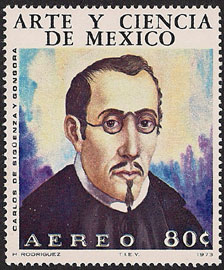MEXICO, 1973, Art & Science series, Scott C418Carlos de Sigüenza y Góngora was one of the first great intellectuals born in the Spanish viceroyalty of New Spain. A polymath and writer, he held many colonial government and academic positions. Sigüenza was born in Mexico City in 1645. He studied mathematics and astronomy at home with his father, who had been a tutor for the royal family of Spain.
Sigüenza entered the Jesuits on August 17, 1660, took simple vows on August 15, 1662, and left the society in 1667. In 1672 he was named to the chair of mathematics and exact sciences at the University of Mexico and was ordained a priest in 1673. He was chaplain of the Hospital del Amor de Dios from 1682 until his death. He was well-known as a man of science, a poet, non-fiction writer, historian, philosopher, cartographer and cosmographer. In 1693, he published El Mercurio Volante, the first newspaper in New Spain. In 1694, he retired from the University.
The Diccionario Histórico de la Compañía de Jesús (Volume 4) says that Sigüenza petitioned the Jesuit superior general Giovanni Paolo Oliva to be readmitted into the Society in 1668 and 1676. However, it was only shortly before his death in 1700 that he was reaccepted; this would have to have been under Fr. General Tirso González (1687-1705). After his death of a kidney ailment in the Hospital del Amor de Dios in Mexico City, where he had spent much of his career, he was buried with great solemnity in the Colegio de San Pedro y San Pablo. He left his body to science and his library to the college. He also left a number of unpublished manuscripts, only fragments of which survived the Jesuit expulsion from the viceroyalty. More
